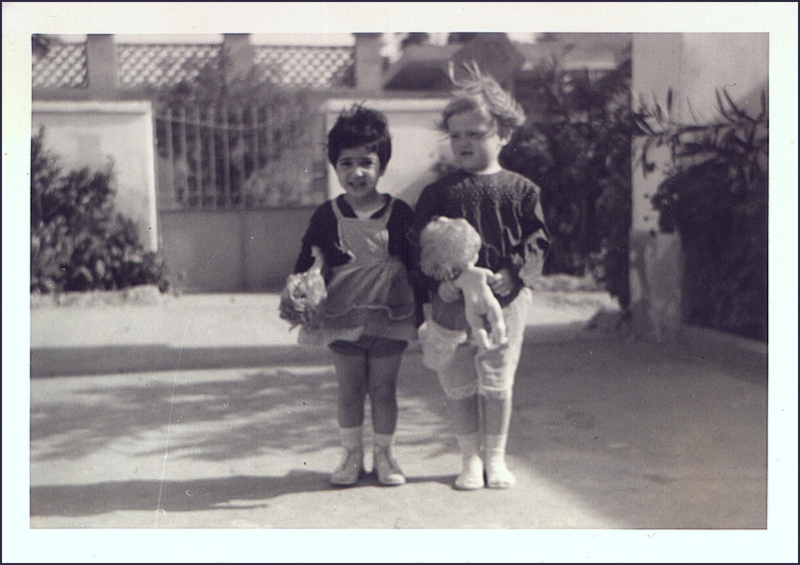When We Played At Being Ladies Posted by Geoff on Mar 13, 2017 in Culture, Italian Language
Here’s my English translation of Serena’s Blog Quando Giocavamo Alle Signore.
Come mi piaceva giocare con le bambole da bambina! E quanti pianti ho fatto!
How I loved playing with dolls when I was a child! And how I cried!
Ero l’unica femmina e avevo tre fratelli maschi, così spesso li scoprivo che giocavano a pallone con le teste delle mie bambole, o smembravano le mie adorate perché volevano fare i dottori: “Emergenza, emergenza! C’è un ferito che ha perso una gamba!” urlavano i miei fratelli tutti eccitati mentre staccavano una gamba o un braccio ad una delle mie bambole che avevo distrattamente lasciata in giro. Alla sera aspettavo ansiosa in cima ai gradini del garage che mio padre, il dottore delle bambole, tornasse a casa per aggiustarmi la bambola fatta a pezzi da quei mostri dei miei fratelli.
I was the only girl and I had three brothers, so I often discovered them playing football with my dolls heads, or dismembering my loved ones because they wanted to play doctors: “Emergency emergency! There’s a wounded person who’s lost a leg!” my excited brothers cried as they detached a leg or an arm from one of my dolls that I’d carelessly left lying around. In the evening, I anxiously waited at the top of the garage steps for my father, the doll doctor, to come home and fix the doll that had been pulled apart by my monstrous brothers.
L’estate, quando ci trasferivamo nella nostra casa di vacanze a Montorio Romano vicino a Roma, le cose andavano meglio perché lì ci raggiungevano vari cugini, per cui i miei fratelli si dimenticavano di me. In compagnia dei cugini maschi, erano troppo presi a rubare la frutta dagli alberi nel terreno di fronte a casa o a cavalcare il mulo del contadino per badare a noi bambine, e finalmente io, insieme a mia cugina Anna Maria, ero libera di giocare con le mie bambole senza pericoli!
In the summer, when we moved to our holiday house in Montorio Romano near Rome, things went better because various cousins came to join us there, so my brothers forgot about me. In the company of their male cousins they were too busy stealing fruit from the trees on the land in front of our house or riding the farmer’s mule to bother with us girls, and finally, together with my cousin Anna Maria, I was free to play with my dolls without danger!
Uno dei nostri giochi preferiti era ‘giocare alle signore’: Anna Maria ed io sistemavamo le bambole vestite a festa sulle nostre seggioline impagliate intorno a un tavolino costruito da mio padre. Quindi apparecchiavamo il tavolino con il mio servizio da tè di ceramica decorato con violette, poi prendevamo un paio di biscotti e li mettevamo in un piattino. Infine ci scambiavamo dei complimenti, tipo: “Com’è buono questo tè, Signora!”
One of our favourite games was ‘playing at being ladies’: Anna Maria and myself arranged our dolls, all dressed up in their Sunday best, on our straw seated chairs around a little table that my father had built. Then we laid the table with my ceramic tea service decorated with violets, and we got a couple of biscuits and put them on a saucer. Finally, we exchanged compliments such as: “This tea is very good, madam!”
Siccome eravamo delle brave bambine ben educate, delle volte portavamo le nostre bambole alla messa. Per questa occasione mettevamo le seggioline in fila una accanto all’altra e sistemavamo dei cuscini per terra davanti a noi per inginocchiarci.
As we were very well behaved little girls we sometimes took our dollies to mass. For the occasion we put our little chairs in a row one next to the other and placed cushions on the ground in front of us to kneel down on.
Erano ancora i tempi di prima del Concilio Vaticano II, quando le donne dovevano coprirsi il capo per entrare in chiesa. Per questo le signore usavano dei leggerissimi fazzoletti triangolari di pizzo (bianchi, beige o neri a seconda del vestito), che appoggiavano sulla testa senza legarli. Anna Maria ed io, non avendo i nostri fazzoletti di pizzo (le bambine non dovevano coprirsi la testa fino alla cresima), usavamo dei quadrati di carta igienica che mettevamo sulle nostre teste e su quelle delle bambole.
It was still in the days before the Second Vatican Council, when women had to cover their heads to go into a church. For this, the ladies used very lightweight triangular lace handkerchiefs (white, beige or black to match their dresses), that they rested upon their heads without tying them. Not having our own lace handkerchiefs (little girls didn’t have to cover their heads until confirmation), Anna Maria and myself used squares of toilet paper which we put on our and our dollies heads.
A mani giunte, tutte compunte cominciavamo a salmodiare parole inventate (la messa a quei tempi era ancora in latino), sedendoci ed alzandoci in piedi continuamente. Ad un certo punto facevamo squillare il campanaccio svizzero per le mucche che ci aveva portato lo zio Luciano da Zurigo, e ci inginocchiavamo sui cuscini. Il problema più grosso era che con tutti questi movimenti i quadrati di carta igienica volavano via, rovinando l’atmosfera.
Very solemnly, with hands together, we began to chant made up words (at that time mass was still in Latin) whilst continually sitting down and standing up. At a certain point we rang the Swiss cow bell that my Uncle Luciano had brought us from Zurich, and knelt down on the cushions. The biggest problem was that with all this moving about the squares of toilet paper flew away, spoiling the atmosphere.
If there’s anything in this translation that you don’t understand please feel free to leave a comment.

Build vocabulary, practice pronunciation, and more with Transparent Language Online. Available anytime, anywhere, on any device.






Comments:
Rita Kostopoulos:
Grazie per il ricordo della infanzia. Io facevo cose uguali solamente che io facevo il prete e ascoltavo I peccati delle mie compagne e loro dovevano pagare due lire per il peccato commesso .
Serena:
@Rita Kostopoulos Brava Rita, molto ingegnosa! 🙂
Melissa:
Thank you for this! I had to look up a few words, but overall I understood most of it. Loved the ingenious use of toilet paper as lace headcovering. More stories, please!
Norma Tingram:
‘tre fratelli maschi’? è ridondante?
Serena:
@Norma Tingram Salve Norma!
La parola fratelli (al plurale) indica sia ‘brothers’ sia ‘siblings’, per cui tendiamo a precisare il genere dei fratelli. Avrei potuto dire: ho tre fratelli, due maschi e una femmina.
Saluti da Serena
Evelyn Ferioli:
Ho apprezzato Molto questa storia. Ho capito il 75% di esso. Grazie per il blog.
nemesia:
Mi sembra una bellissima descrizione dell’infanzia, cosi lontana di questi tempi senza innocenza
Complimenti agli autori
Serena:
@nemesia Grazie Nemesia!
Ghalb Elfituri:
It is nice to see a picture from my beloved city Benghazi.
When was the photo taken? and where was that place? was your neighbor Libyan?
Thanks for sharing us memories 🙂
Serena:
@Ghalb Elfituri Salve Ghalb Elfituri!
Are you from Benghazi too? That photo must have been taken in 1967-8. It was in Fouyat (I don’t know how to spell it). I’m the girl with the dark hair, my neighbour is the blond girl, she was American. At that time there was a paediatric clinic run by Americans, nearby. They all lived in the Fouyat. My neighbours on the opposite side of the road were Libyans, Boukhaila, a very nice family.
Your surname seems familiar to me, it reminds me of some of my father’s friends or colleagues.
Here are some links to some of my father memoires (he was born in Libya):
https://blogs.transparent.com/italian/my-fathers-war-part-1/
https://blogs.transparent.com/italian/my-fathers-war-part-2/
https://blogs.transparent.com/italian/my-fathers-war-part-3/
https://blogs.transparent.com/italian/my-fathers-war-part-4-pow/
Saluti da Serena